The education of a coach
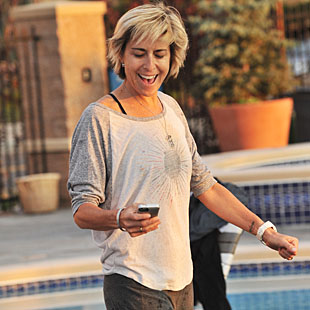
A dozen years after her 2001 ITU Olympic distance World Championship, Siri Lindley has far eclipsed her own racing success with athletes she has coached to Olympic bronze, two Ironman 70.3 world titles and three Kona wins. Her coaching breakthrough was guiding longshot Susan Williams to a bronze at the 2004 Olympics. Next landmark was Mirinda Carfrae’s wins at the 2007 Ironman 70.3 Worlds and the 2010 Ironman World Championship. When Carfrae left in 2012 after 7 years together, 2-time ITU world champion Leanda Cave sought out Lindley. Their collaboration produced a rare double – the 2012 Ironman 70.3 and Ironman world championships. While Cave fought a series of injuries in 2013, Lindley welcomed Carfrae back to her squad in mid-year and their renewed partnership paid off with another Kona win –a women’s race record that broke the mark set by 4-time champion Chrissie Wellington.
Although Cave left to work with coach Cliff English, Lindley is going forth in 2014 with one of the most talented squads of Ironman women ever assembled. In addition to Carfrae with her two wins and three sub-9 hour performances at Kona, they include Yvonne Van Vlerken (six Iron-distance wins, six sub-9 hour Iron-distance performances and an 8:43:07 Ironman PR), Rebekah Keat (six Iron-distance wins, five sub-9 hour performances and 8:39:24 Iron-distance PR), Mary Beth Ellis (eight Ironman wins, two sub-9 hour Ironman performances and 8:43:35 Ironman PR), and Jodie Swallow (one Ironman win, two sub-9 hour performances, and world titles at Ironman 70.3 and ITU Long Distance). Although most of these wins were achieved with other coaches, it is a sign of Lindley’s reputation that these stars entrust Lindley with their fates at the peak of their careers.
In addition, Lindley is guiding nine more triathletes including Ironman winners Amanda Stevens, Hillary Biscay and Dede Griesbauer and up-and-comers Valentina Carvallo, Chris Foster, Damon Barnett, Raphael Menenzes, Carol Galvao and Elli Salthouse.
This interview is about Lindley’s growth from a scared, insecure young triathlete to a World Champion who became a master coach at the top of the sport. While Lindley talked at length about all her athletes, this article focuses on the 2013 season and the shifting fortunes of her two Ironman World champions.
LEARNING FROM BRETT SUTTON
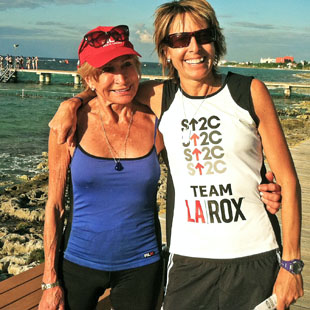
Slowtwitch: Sum up your experience with Brett Sutton, who started coaching you in 2001 when you were 28 and feeling down because you did not make the 2000 U.S. Olympic team.
Siri Lindley: Brett is my greatest mentor. And he saved me from myself.
ST: What did he save you from?
Siri: Insecurity. I lived my life from a place of fear, not a place of love or joy. And I didn’t believe in myself. He got me at a time when I was coming in 4th in a lot of World Cup races. In my mind, I thought: ‘I can be good, but I’m never gonna be good enough.’ That way of thinking needed to be broken.
ST: What in your past gave you that outlook?
Siri: Early in my life, I definitely had hard times and things that were difficult to get through. I am grateful, because that led to my relationship with my mom, who has been my greatest supporter and my best friend and my biggest inspiration. I would not have the relationship I have with her now if we had not gone through all that as a kid. On the same note, my dad was incredible and really helped me become the athlete I became. We were very close – until he remarried, had two kids and basically began a new life which didn't really include me. That hurt a lot and around that time I felt that I lost my dad.
ST: How did Brett shake you out of that competitive insecurity?
Siri: I was at a point where I was sick of that insecurity, sick of falling short. Eventually you draw the line. That is it! No more! Brett knew that is what I was thinking and he worked me through it. I had arrived at a place where I put so much pressure on myself. I would take one race and make it the be all and end all in my life. Brett said: ‘You know what? You come to me and let’s consider you as retired. And all we are doing is you are racing because you love the sport. That's how you started, so let’s go back to that.’ He made it sound fun.
ST: That doesn’t sound like the Aussie drill sergeant of legend?
Siri: The process wasn’t easy. Brett is brutally honest and sometimes the truth hurts.
ST: Why was that brutal honesty not reinforcing your insecurity?
Siri: Because it made me mad.
ST: What was it like?
Siri: My first night I called home to my mom [Astrid] and was in floods of tears. I couldn’t even form the words about how scared I was and how upset and how I didn't know if I could survive it. It was just so difficult and scary. But the fact was, every day I survived and every day I got through it and every day I was getting stronger.
ST: Did he make you tackle your problems head on?
Siri: He didn’t say, ‘Siri, this is your problem and this is what we need to deal with it.’ He knew that my fear and insecurity meant I could succeed to a certain point but there is no way I could do it at that highest level. So every single day he presented me with something I thought was impossible. But then I would do it. So day after day I was gaining success. Not doing anything brilliant, but doing something new I never thought I would be able to do. And that taught me I am actually pretty strong. I am pretty resilient. And I can achieve things I didn’t think were possible.
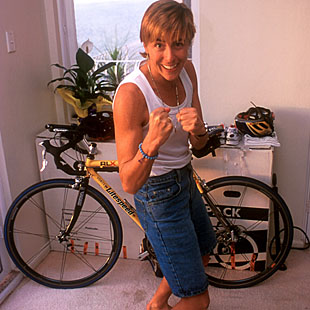
ST: So that gave you a launch pad to break through your limitations?
Siri: Yes. It was a process, and I needed time. You can have people telling you you are talented, and you are this and you are that. But until you believe it yourself, that it’s false confidence. Real confidence comes from real results and real training. It must be truthful. Looking back, if I told you what I was doing, you would think, ‘This is ridiculous! You must be joking!’ But I did it and it was empowering. I was developing respect for myself.
ST: If you had not succeeded in competition, would this experience have benefited you?
Siri: When I graduated from Brown University I had a psychology degree and there was a time I really wanted to go back and get my PhD. Psychology just fascinates me and I wanted to use it in my life. Little did I know, when I found my calling one of the biggest aspects of coaching is my knowledge of psychology. With my athletes I look for something — an insecurity, a doubt or a fear – that I can address. I help them overcome whatever weakness they are battling to take that step forward. None of us is perfect. We all have things we can improve that will make us better persons, better athletes.
ST: Was that ability to see what needed to be fixed instinctive?
Siri: That was something I took from Brett – the master of gut instinct. He could look at someone and know what they needed to do. And that is at the core of how I coach every athlete. When I say that I coach every athlete differently, I really do. That comes not from reading a book. It is looking at the person and seeing what this person needed to do. The more I rely on instinct, the better results.
ST: One thing Sutton does sounds fun: He has everyone bike from Leysin to Alpe d’Huez, do the race, and bike back. Do you test your athletes with epic workouts?
Siri: I don’t think all of that strategy is wrong. But I am very different. I don't have that kind of courage to have my athletes do something crazy. I feel that is a good toughening exercise that makes sense. But my athletes have proven how tough they are, and I don't feel the need to do that.
ST: I recall you were upset when you could not reach Brett before your last race – the 2002 ITU World Championship. Why did that happen?
Siri: I think he didn’t agree with me retiring at that time. He saw I put enormous pressure on myself before that last race – which was returning to an insecure mindset. I think that it was hard for him to see me regress after achieving so much success together. I was in the form of my life for that race. On paper I should have been able to win it. But I didn’t because I put myself under that old pressure.
ST: You forgot to take enough water on that hot day. Maybe subconsciously, it was intentional? [Lindley was a co-favorite but faded to 13th, a race that Leanda Cave won].
Siri: I thank God for all those experiences as an athlete because they have helped me understand myself.
FORGING HER OWN IDENTITY AS A COACH
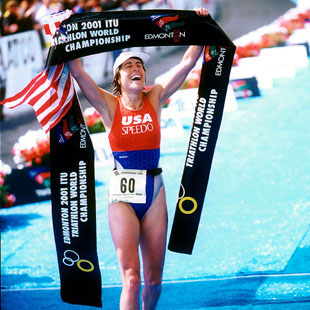
ST: I never fully understood why you quit racing after 2002?
Siri: I was actually ready to retire after I won Worlds in 2001. I had finally achieved something I thought was impossible and it was all I needed — knowing that if I want something bad enough and I’m willing to do the work, I can achieve it.
ST: What prompted you to race another year?
Siri: I wanted to prove I was not a fluke. I feared it might be thought: ‘Oh she had ONE good year.’ So I challenged myself to put together another year like 2001. I vowed, ‘I am going to win as many races as I can and finish at Number 1 in the world.’ Although I didn’t win another world championship, I kept the world number one ranking and I won five races. That was enough to walk away knowing I was the real thing.
ST: What did you do after retiring?
Siri: I was a mess. I knew what it took to be on top and win races — training incredibly hard every single day for 10 months of the year. It took feeling utterly exhausted all the time — and I wasn't willing to do that any more.
ST: In some ways short course ITU racing could be more debilitating than being an Ironman athlete?
Siri: I found it incredibly exhausting to go that hard all the time. On the same note, I cannot imagine the pain of racing an Ironman. But yeah, that was it. I always put tons of pressure on myself before every session. I just had enough.
ST: What happened next?
Siri: I had this idea that I had to retire cold turkey and stop training for a while. It’s kind of a psychotic thought. After three months, I felt terrible and thought, ‘So what am I doing? I love running, I love being outside and being fit.’ I just started running again. At that time Jill Savege called me and asked, ‘What do you think of coaching me?’ I thought, ‘Oh my God! I SO want to do this.’ But I told her ‘Let me call you back tomorrow. Let me think about this.’ After I reflected, I knew this is what I’m going to do.
ST: Jill Savege was one of the few people who beat you in 2002.
Siri: She beat me at the Hamburg World Cup. It was a sprint finish and I remember she could not believe that I was giving her a hug and saying, ‘Great job!’ I felt she had an amazing race and we just connected.
ST: What do you feel when an athlete comes to you?
Siri: When an athlete asks me to coach them, they have a dream. This is a powerful, precious thing. I've been dreaming since I was a little kid, wanting to do all these things. So when athletes are coming to me and saying, in effect, ‘Siri, I want to put this dream in your hands’ – those dreams are gold.
ST: Like a bubble – beautiful and fragile.
Siri: Exactly. So fragile. It gives me goosebumps. I feel so honored.
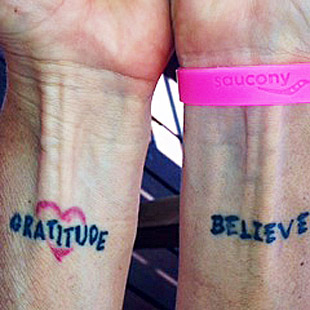
ST: What are the similarities and differences between you and Brett?
Siri: There are certain words I live by. I have them tattooed [on the inside of her wrists] Gratitude. Believe. Love would be a third one — but that is right here in the center [points to the her heart]. I like to live my life from a place of love and not fear because I lived by fear for so long. And I realize how much you can accomplish when you love what you are doing and believe in a goal.
ST: Interestingly, you have achieved your greatest coaching the Ironman – in which you did not compete.
Siri: Ironman holds a special place in my heart. I think before my athletes started doing 70.3s and Ironman, I was a lot more like Brett in how I trained my Olympic distance athletes. When I was entering this unknown territory, it was a time when I knew: You are on your own now – and you have to figure this out. It was the ultimate challenge. I chose to believe in myself – and I really needed Rinny to believe, too. And she did. For that, I forever thank her.
ST: Not just for her performances?
Siri: Before we did anything, she chose to believe. Just as Brett gave confidence to me as an athlete, it gave me the confidence to keep stepping forward and doing things in a way I believe in. It's the first time I believed in myself and had the courage to try something so new and big — and it worked.
ST: What was the process of becoming a coach?
Siri: Brett taught me so much about myself — and I learned a lot about training and coaching watching how he does things.
ST: What were some other influences?
Siri: Brett wasn’t my only coach. I started with Jack Ralston in New Zealand, who just passed away this year. He brought me from an amateur to those 4th place finishes. He taught me the power of positive re-enforcement. If you have done something well, I will SO let you know. If you did something wrong, I am going to let you know that, too. But I am going to be sensitive and I am going to be constructive in a way that is gonna inspire you to want to fix it and not make you feel ashamed or down on yourself. Finally, you put all that knowledge and all those influences together to form your own system.
LEANDA’S TOUGH YEAR
ST: After her triumphs in 2012, what led to Leanda’s frustrating season in 2013?
Siri: She had a longer off season than normal. When you do, you have to be patient coming back. Ideally, she would start racing later – in April or May. But she wanted to start racing sooner. Athletes at this level have an incredibly high pain threshold. And so most likely a niggle is worse than they think because they are all so tough. I also think we didn’t communicate enough in February, March and April when we weren’t together.
ST: Looking back, should you have visited her in Tucson?
Siri: I think I could have gone to Tucson and recognize what was happening. You can see these things – when running they are protecting one leg or they are riding more on one side of the saddle. At the first sign of a niggle, I say, ‘OK. Take a week off. Let’s take care of it and you are back in a week rather than pushing through it and dealing with it all season.’
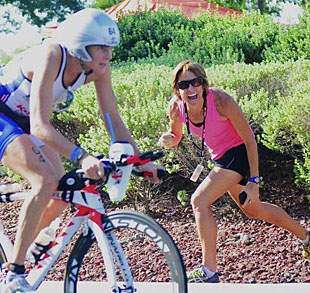
ST: Was Leanda her own worst enemy?
Siri: Leanda is strong. She is tough. She is dedicated. She is passionate. Those qualities are great, but they can become dangerous because she wanted to live up to all the self-imposed pressure after winning two world championships. That can lead any athlete, no matter how smart they are, no matter how experienced, to believe that everything is just fine. So by the time she arrived in Boulder [in May] she rushed through things when we should have taken a step back.
ST: Was it hard to get through to her?
Siri: I remember as an athlete saying ‘Oh no, no, no. I can do this session. I will be fine.’ I did that many times. But I learned that when I pushed through when I knew I shouldn’t, it only got worse.
ST: Did Brett Sutton stop you from doing the same thing to yourself?
Siri: No.
ST: Were you injured while working with him?
Siri: Yes. I had really bad plantar fasciitis the last three years of my career. It feels like you are running on a knife every second. You can manage it until it actually tears. I would push it and every four months I’d tear it and I’d be out a month. Now I am on the side of early prevention.
ST: Leanda’s injuries became worse until things came to a head after the Columbia Triathlon.
Siri: Then I said ‘I don't care if it takes two months; we need to take care of it.’ She agreed and she gradually improved. When she raced Boulder 70.3 in August, she finished second to Melissa Hauschildt. I said, ‘That was fantastic. We are in a great place.’ But she said, ‘It still really hurts.’ I said ‘Well then that's not OK. We need you 100 percent for Kona.’ A chronic injury is the worst thing for a professional athlete. They want to make money to pay their bills and their sponsors want to see them racing. I understand all that pressure.
ST: She still had a really good swim and bike at Ironman Hawaii.
Siri: Yes. At that time, she performed at 110 percent of what she was capable that day. She just didn’t have enough (training) time to back up her run.
ST: How did it affect Leanda that Mirinda was steadily advancing from a slow start — 8th, 6th, 4th, 5th, 2nd, 1st – and Leanda wasn’t making much progress?
Siri: When Rinny asked to come back, I asked Leanda, ‘Rinny wants to come back. I really want to take her on again. But I want to know that you are OK with it before I say yes because I don't want to affect what we have.’ Leanda, being the ultimate in sportsmanship, said, ‘Siri, I have been with you long enough to know that you give each and every athlete 110 percent. As long as I am getting my 110 percent, I am happy. Rinny and I will only make each other better.’
ST: You and Rinny had been apart 18 months.
Siri: It felt like forever. It felt like crap. And when Leanda gave her support, it just showed what a quality human being she is.
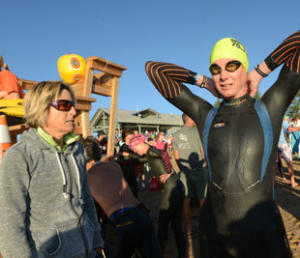
ST: Did Leanda’s injury interfere with the intended synergy?
Siri: At first Rinny was really struggling and so was Leanda. The vision was they could help each other get through it. The difference was that Rinny’s troubles were really quickly addressed. With Rinny it was like the fog lifted for her and we knew everything would be great. Whereas Leanda was dealing with an injury that just wasn’t going away. Leanda never said it was hard but I can imagine it was hard to see Rinny take off whereas things were moving slower with Leanda.
ST: Did you experience something like that with Brett Sutton?
Siri: Loretta Harrop [1999 ITU World Champion and Olympic silver medalist] got Brett to take me on initially and I am forever grateful to her. She is my best friend and I am godmother to her kids. She was the best triathlete in the world and I looked up to her. I can never forget the first race where I was coming up on her and I was about to pass this person who had given me the opportunity to be her training partner. I was holding back and Loretta turned to me and said, ‘Siri, don’t effing do that! Pass me!’ Those moments are hard. This is sport. This is life. So I knew Leanda was struggling and I let her know this was a hard time but she was as important to me as she always has been. I think that's why it’s so heartbreaking. In my job there is nothing sadder than when an athlete that you love and care about leaves. I am still not over it. But I don't let it stop me.
ST: Do you suppose she might have felt that Rinny was getting the same coaching regimen?
Siri: First of all – everyone I train is under my philosophy. But because they are all very different, they get very different workouts. Leanda has a very different body and reacts differently to training than Rinny does and Rebekah does and Mary Beth does. Nobody is ever going to be on the same plan. They might all go for a long ride one Saturday, but they will be focusing on different things. The fact is, if they did the same training, I’d get one good athlete. And I don’t want just one good athlete. I want 15 amazing athletes who are all being the best that they can be.
ST: Any regrets?
Siri: I just wish that Leanda’s decision to leave wasn’t made at a time when she was injured. I had so many dreams for her and things I wanted to do to get her to the next step. I want her to be happy and I know that once the bruising goes away we will be amazing friends.
REUNITED WITH MIRINDA CARFRAE
ST: What was your first reaction to the split?
Siri: The first thing I felt was a natural insecurity. I thought she doesn’t think I did enough to make her want to stay. So you question yourself. And I had even more motivation to achieve something with someone else. The fact that Leanda and I were able to do what we did made a big impact on me.
ST: What did you feel when Mirinda approached you last year?
Siri: Some of the greatest moments of my life have involved Rinny. So in late May, I was grateful she had the courage to talk.
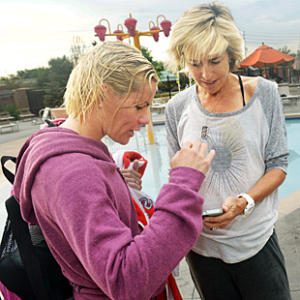
ST: How did that go?
Siri: We sat down and we cried. We talked about how and why we were both hurt. Then we decided this is home — she and I working together with the squad. Over 7 years, you get to know each other so well. I think we had this magic, and we could achieve anything together.
ST: Some say that when you are with a coach for so long there is nothing new to learn and you need to move on.
Siri: That is a theory. But I am someone who wants to get better each year. I am constantly learning, constantly changing. I think Rinny would say that when she came back, I was doing a lot of things differently.
ST: Why did Rinny have a slow start last season?
Siri: Rinny had been working with Joel Filliol and he had done some great work with her as she was very fit when she returned. I don’t know what phase she was in her training. But in my eyes she was lacking some energy and some spark. I don’t want to say she was over trained. But I thought she was doing way too much. She was physically, mentally and emotionally down. Compared to the work we used to do, I thought, ‘My God, we need to halve things and make it fun for a little while.’ I wanted her to get her spunk back.
ST: She went from 5:10 bike splits at Kona to 4:58. That seems to be her biggest leap forward.
Siri: I think she got a lot out of being away and her advisers definitely did address her bike. But it was not as big an issue as once thought. I felt we needed to put more focus back into her strength — the run — and get the swim going while also continuing to develop the bike. We especially needed to address how the work was ordered in relation to the other sessions.
ST: Was it a mix of less mileage and some intense workouts?
Siri: Some athletes thrive on going long all the time. Rinny needed a really perfect balance of long days, intense days, recovery and technique. It was a matter of correct sequence and timing. Those things need to be in balance leading into the race. But you also need to establish a week after week routine doing things right. And we did that from June 1st to October 13.
ST: Kona is an overall energy equation — how did she run 2:50 after her fastest ever bike?
Siri: We began in June with a two week break. A lot of recovery and getting back into the mode of doing things the way I like to do them. Also when you are in an environment that makes you happy, your reduce stress and expend less energy.
ST: With at least a dozen athletes, how do you manage everyone leading up to Kona?
Siri: In August and September, I start working 14-15 hour days and my athletes start doing more alone. That’s the way it has to be. At that point it gets more complicated for me to manage everyone’s training and confidence and things like that. So it is much better for me to spend a 2-hour ride with Rinny, a 2-hour ride with Yvonne and then a 2-hour ride with Rebekah to get a close look at where everyone is at. I am running from session to session because there are certain people I know who are good to ride together. Bek and Rinny train great together. But as you get closer to Kona, I wanted her to ride with [fiancé] Tim O’Donnell and Julie Dibens because that also makes her happy.
ST: When did you suspect Rinny might have the race of her life?
Siri: It was after a really important brick session 5 weeks out after which we went out to eat and discuss. Did I say ‘Do you know I am thinking you are in the form of your life?’ I would NEVER say that to her. I always tell my athletes when they have done something well. And I always tell them when they have done something not so well. But I do it in a way that is kind and not harsh. After this one session, I talked about her readiness in a way that was not my usual style — and Rinny noticed.
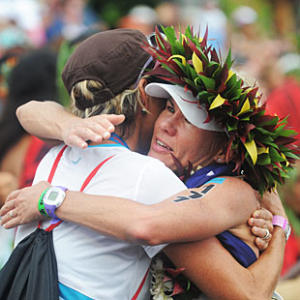
ST: What did you say?
Siri: I said, ‘You are capable of running 2:50.’ We were discussing where I wanted her to be at the 10k mark of the run and I threw out a number. She said ‘Oh my God.’ She knows when I throw out a number, I know she can do it because I would never set her up for failure. On race day she hit that number exactly on the 10k mark and she ran exactly 2:50.
ST: What was her 10k split?
Siri: It was 37 or 38 minutes.
ST: What was different about her riding going into this race?
Siri: Peak confidence only comes from real work and real results in a real environment. But unless they prove it in training it’s not going to happen. That real confidence is the most powerful thing you can have going into a race.
ST: Thirty five miles into the bike leg, Rinny wasn’t in the first pack. Was her early pace OK?
Siri: I didn’t expect her to be in the front pack coming out of the swim. [Carfrae’s 58:50 swim was 4:40 back of Rachel Joyce, Liz Blatchford, Caroline Steffen, Meredith Kessler, Amy Marsh and Lindley’s athletes Amanda Stevens, Leanda Cave, Jodie Swallow and Rebekah Keat] I was stoked that Rebekah, Amanda and Leanda were all in the front pack. And where Yvonne came out of the swim [1:01:57], I expected that as well. They all have their game plan and Rinny and Yvonne were all right on target.
ST: Was there a tipping point for Rinny between a race record at Kona — and a pretty good day?
Siri: I think the biggest challenge for everyone at Kona last year was the fact that midway through the run they were on their own from the gas station on the Queen K into the Energy Lab. That is the most difficult part of the run. When I saw Rinny come out of that section, I knew she nailed it. It had been really rough. It killed some other people, but it boosted others.
ST: How could you tell she was on her game?
Siri: She was loose. Her shoulders were back. Her cadence was beautiful. She had power in every step. She was just – I don’t like to use the word floating because it sounds almost weak. She was perfectly efficient and perfectly powerful in every step. She was laser focused. Her sweat rate was great, she had nailed her nutrition, nailed her hydration. At that point, I knew she was on target to break Chrissie’s race record.
ST: Do you tell her?
Siri: When she won it in 2010, I said ‘You can break the course run record.’ This year I said, ‘Vincent.’ I call her Vincent. ‘You’ve got the race record if you kick it in!’ LAUGHS To hear ‘Kick it in’ when she was completely at her max might seem irritating. You can tell if you shouldn’t say something like that because the athlete is on the edge and if they try to kick it in they are going to drop. But I knew Rinny could handle it. I knew she was able to find one more gear — and she got the record.
ST: What were your emotions about that achievement?
Siri: It was the greatest moment in my life – because of the beautiful way that life brought us back together to make this happen. I never felt so grateful and so thankful and blessed in my life as I did then. Also, Rinny doesn’t have another opportunity to beat Chrissie because Chrissie is not racing any more. We wanted the opportunity to race Chrissie again. But if that’s impossible, we have that record.



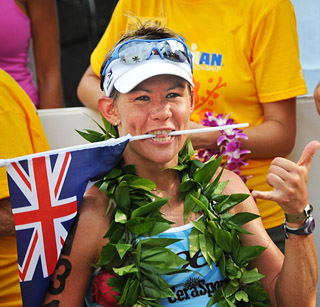
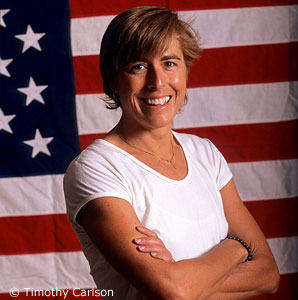
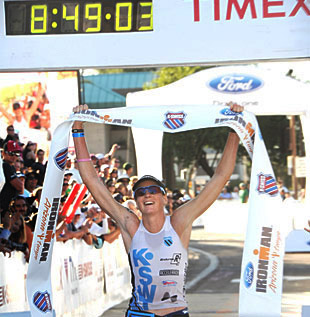
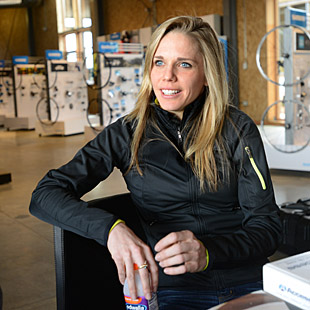

Start the discussion at forum.slowtwitch.com